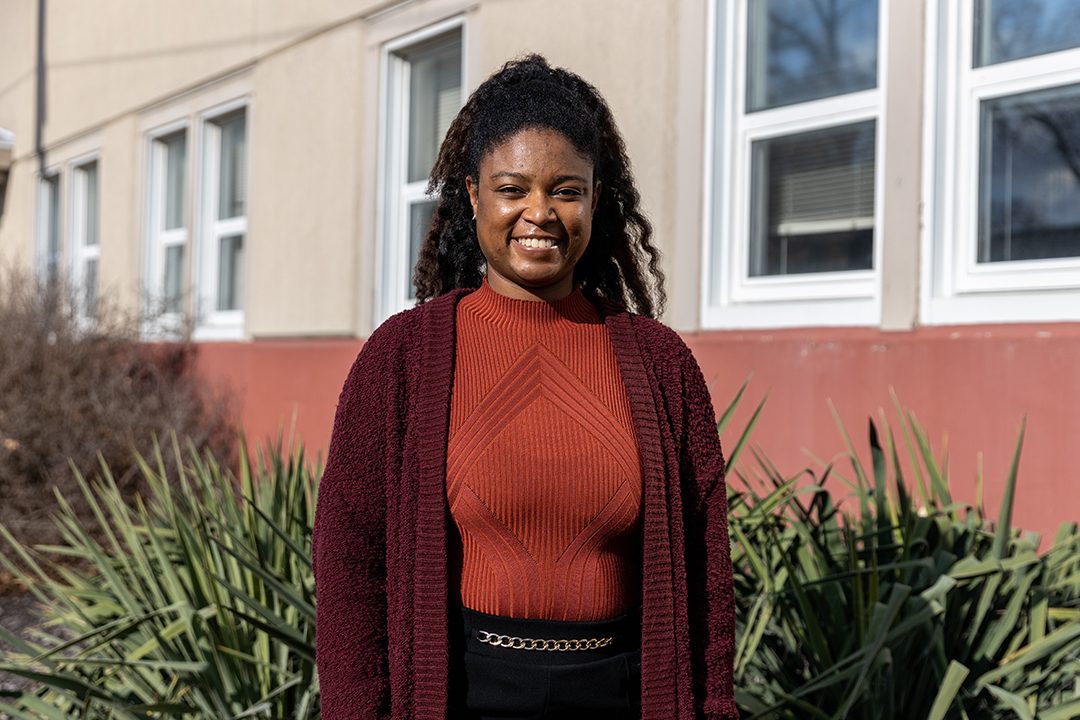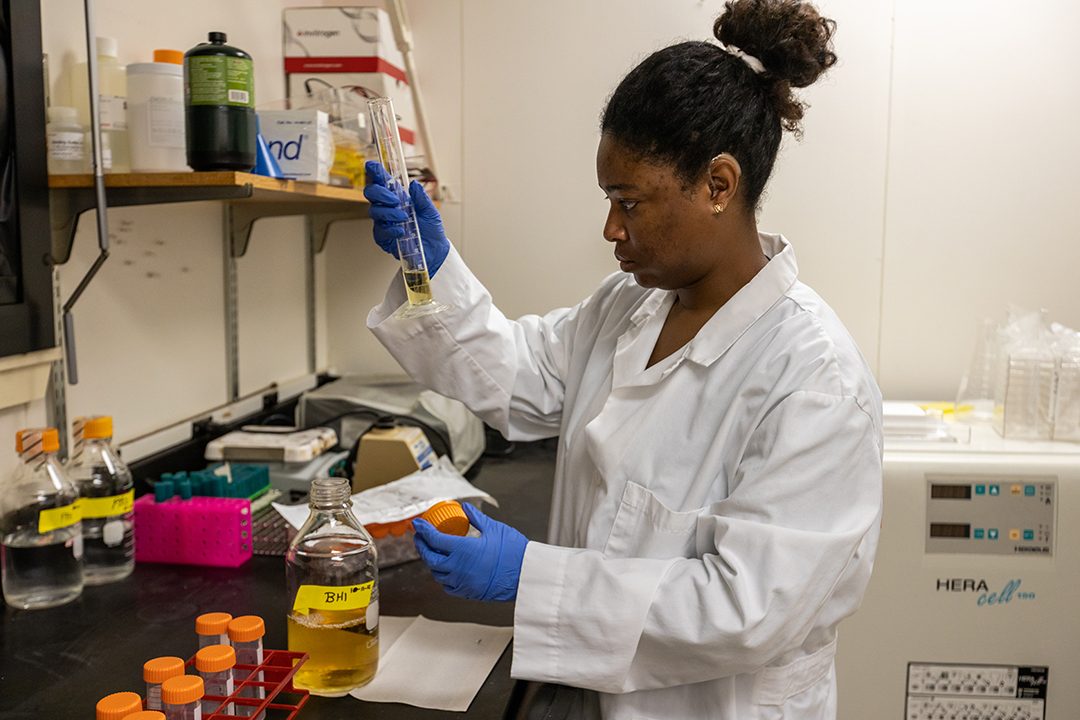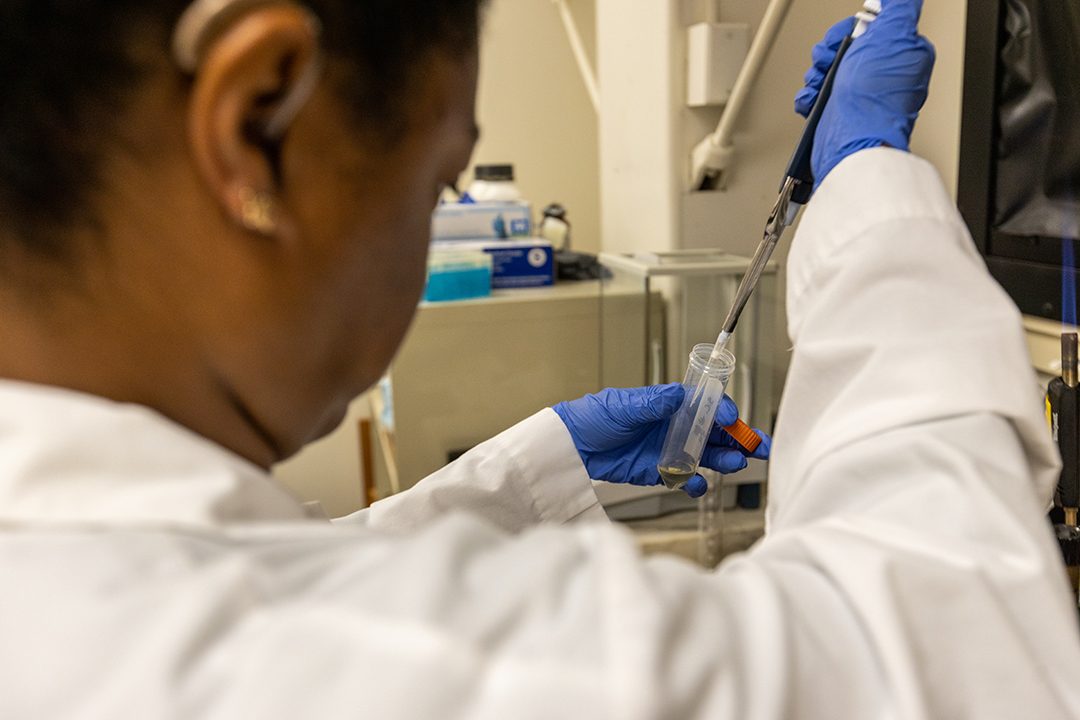Dec. 12, 2022
Contact: Marcus Wilkins, wilkinsm@missouri.edu
Photos by Abbie Lankitus
Katherine Meiser earned her undergraduate degree at Gallaudet University in Washington, D.C., the nation’s preeminent school for the deaf. So, as she recounts her scholastic journey to the University of Missouri and graduate school, her hands tell the story via American Sign Language with graceful clarity.
But when she found herself at an academic crossroads in 2015, the way forward wasn’t as clear. She loved biology (her undergraduate major), research and — as the owner of two dogs, two cats, two snakes and an iguana — animals. That love of animals even led her to a veterinarian internship in her hometown of St. Louis, but she wasn’t sure it was a fit.
“I knew I wanted to help animals, but I wanted to focus more on infectious diseases that were high risk and dangerous,” Meiser said. “It wasn’t until I watched the National Geographic TV show Hot Zone, featuring a character who is a veterinary pathobiologist, that I thought, ‘That’s it! That’s what I want to do.’”
Fascinated by big-picture interactions between human and animal health, Meiser set course for dual degrees — a master of public health (MPH) and a PhD in veterinary pathobiology through the School of Health Professions and the College of Veterinary Medicine, respectively. This week, she’ll complete the first leg by receiving her MPH diploma — all while already progressing toward her PhD.
It is an accomplishment made possible in part by the mentorship of Pamela Adkins, assistant professor of food-animal medicine and surgery in the College of Veterinary Medicine. Adkins’ laboratory focuses on bovine mastitis, a disease that reduces milk production in cattle and costs the dairy industry billions. It is in this lab that Meiser focuses on identifying antimicrobial properties among common dairy farm bacteria with the goal of curbing mastitis pathogens.
“Katherine’s true passion for learning sets her apart,” Adkins said. “Before coming to my lab, she had no experience with dairy cattle — or much knowledge of how a dairy farm works. She truly embraced the topic and wanted to learn as much as possible. Plus, she has a great sense of humor.”
As colleagues who spend a lot of time in close quarters performing complex research, Meiser and Adkins have come to appreciate said humor in keeping the mood light.
“Occasionally, I’ll test Pamela to see if she catches mistakes I’ve made,” Meiser said. “If I’ve messed up something or missed something in an experiment, I’ll test her to see if she catches on. It’s fun.”
Meiser chose Mizzou primarily because of her degree program, but she has come to appreciate the diversity of resources, people and opportunities that such a large campus community provides. As a deaf student, she frequently works with the American Sign Language interpreters through the MU Disability Center.
Outside of the classroom and lab, Meiser has embraced Mizzou’s classic collegiate atmosphere. She and her husband — who have two sons together — took in their first football game in September at Faurot Field. And she signs “M-I-Z!” with the enthusiasm of a Tiger spirit squad member.
“I would love to try to recruit more deaf people to come to Mizzou,” Meiser said. “Everyone has been so friendly and welcoming, and the Disability Center provides resources for everyone who needs them.”
Meiser is on track to receive her PhD in 2026. She envisions herself working in a high-level laboratory someday — perhaps for the National Institutes for Health or the Center for Disease Control. The hands-on experience she has gained in Adkins' lab has prepared her for the next steps in her education and beyond.
“Katherine is a motivated and goal-oriented student gifted with perseverance and a positive attitude,” Adkins said. “I’m confident she will continue to build on these skills as she moves into the next phase of her education.”






